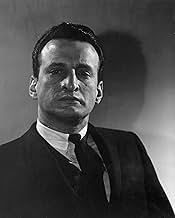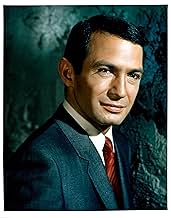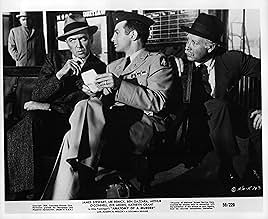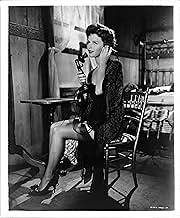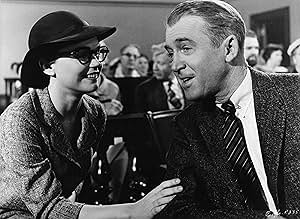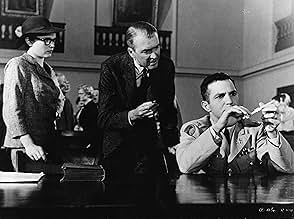An upstate Michigan lawyer defends a soldier who claims he killed an innkeeper due to temporary insanity after the victim raped his wife. What is the truth and will he win his case?An upstate Michigan lawyer defends a soldier who claims he killed an innkeeper due to temporary insanity after the victim raped his wife. What is the truth and will he win his case?An upstate Michigan lawyer defends a soldier who claims he killed an innkeeper due to temporary insanity after the victim raped his wife. What is the truth and will he win his case?
- Nominated for 7 Oscars
- 10 wins & 18 nominations total
- Director
- Writers
- All cast & crew
- Production, box office & more at IMDbPro
8.076.7K
1
2
3
4
5
6
7
8
9
10
Featured reviews
Classy courtroom drama that trades on it's cynical edge
Lawyer Paul Biegler takes the case of Lt. Manion who killed a man after he discovered he had raped his wife, Laura. Biegler realises that the cards are not all in his favour and begins to ensure that the facts are spun in his favour as much as possible during the trial.
This film caused a stir back when it was released supposedly over the dialogue that contained words not used before in a motion picture. However it was more likely that the furore was over the cynical view of the legal profession that the film has. The story is good, but if you're looking for a John Grisham type film with shouting and ridiculous twists in the final reel then you're in the wrong place. What we have here is a clever, interesting story that moves slowly focusing on Biegler rather than twists and turns in the actual plot.
Biegler is sort of clean cut, but he seems like a real lawyer he twists facts and prompts lies in order to improve his case. The various tricks and theatrical shenanigans during the trail are also well observed. The characters are all interesting with only the judge seeming like a dull stereotype.
James Stewart is excellent and helps make the shifty lawyer more likeable and relatable. Remick is excellent as the flirtatious Laura while Gazzara is cool as the accused. George C Scott doesn't have much to do, but does well anyway.
Overall a very enjoyable courtroom thriller it lacks the fireworks of modern legal dramas but has a nice cynical edge to it that shows it isn't as in awe of the law as Grisham is.
This film caused a stir back when it was released supposedly over the dialogue that contained words not used before in a motion picture. However it was more likely that the furore was over the cynical view of the legal profession that the film has. The story is good, but if you're looking for a John Grisham type film with shouting and ridiculous twists in the final reel then you're in the wrong place. What we have here is a clever, interesting story that moves slowly focusing on Biegler rather than twists and turns in the actual plot.
Biegler is sort of clean cut, but he seems like a real lawyer he twists facts and prompts lies in order to improve his case. The various tricks and theatrical shenanigans during the trail are also well observed. The characters are all interesting with only the judge seeming like a dull stereotype.
James Stewart is excellent and helps make the shifty lawyer more likeable and relatable. Remick is excellent as the flirtatious Laura while Gazzara is cool as the accused. George C Scott doesn't have much to do, but does well anyway.
Overall a very enjoyable courtroom thriller it lacks the fireworks of modern legal dramas but has a nice cynical edge to it that shows it isn't as in awe of the law as Grisham is.
First-Class Courtroom Drama
As a courtroom drama, "Anatomy of a Murder" would be hard to surpass. It is a first-class production with an interesting and unpredictable story plus a strong cast. It works admirably, both as a story and as a portrayal of the workings of the law. It avoids the labored dramatics and contrived resolutions in which so many movies of the genre indulge, and it also declines to shy away from pointing out the more ill-conceived features of the legal system.
From his first scene, James Stewart pulls the viewer right into the world of lawyer Paul Biegler. It takes little time before you come to know him and to get a pretty good idea of what his life is like. His scenes with Arthur O'Connell work well in rounding out the picture. The two are neither heroic nor brilliant, but simply sympathetic and believable.
Into Biegler's world then come the characters played by Ben Gazzara and Lee Remick, a married couple with more than their share of faults. By making them less than ideal clients, the movie takes a chance on losing the audience's sympathy, but it adds credibility and complexity to the story. Both roles are played well - again, it seems as if you know a lot more about them than is specifically stated.
When George C. Scott enters the picture, he adds yet another dimension. His character arrives at just the right time to complicate the plot, and his legal skirmishing with Stewart makes some dry material come to life in an interesting way. Eve Arden also has some good moments, and her character is used in just the right amount to add some amusement without causing a distraction from the main story. It's also interesting to see Joseph Welch as the judge, and his portrayal works well enough.
Otto Preminger holds everything together nicely, with the right amount of detail and a pace that keeps the story moving steadily. The result is a very nice contrast to the many run-of-the mill legal/courtroom movies that present such an idealized view of the justice system. It maintains a careful balance, making clear the flaws and unpleasant realities of the system, yet never taking cheap shots either. And it's also an interesting and involved story, one of the most carefully-crafted of its kind.
From his first scene, James Stewart pulls the viewer right into the world of lawyer Paul Biegler. It takes little time before you come to know him and to get a pretty good idea of what his life is like. His scenes with Arthur O'Connell work well in rounding out the picture. The two are neither heroic nor brilliant, but simply sympathetic and believable.
Into Biegler's world then come the characters played by Ben Gazzara and Lee Remick, a married couple with more than their share of faults. By making them less than ideal clients, the movie takes a chance on losing the audience's sympathy, but it adds credibility and complexity to the story. Both roles are played well - again, it seems as if you know a lot more about them than is specifically stated.
When George C. Scott enters the picture, he adds yet another dimension. His character arrives at just the right time to complicate the plot, and his legal skirmishing with Stewart makes some dry material come to life in an interesting way. Eve Arden also has some good moments, and her character is used in just the right amount to add some amusement without causing a distraction from the main story. It's also interesting to see Joseph Welch as the judge, and his portrayal works well enough.
Otto Preminger holds everything together nicely, with the right amount of detail and a pace that keeps the story moving steadily. The result is a very nice contrast to the many run-of-the mill legal/courtroom movies that present such an idealized view of the justice system. It maintains a careful balance, making clear the flaws and unpleasant realities of the system, yet never taking cheap shots either. And it's also an interesting and involved story, one of the most carefully-crafted of its kind.
A Spot-On Courtroom Drama
Anatomy of an excellent movie:
Begin with an extremely tight and well written script, from the novel by the same name. While reportedly the story is based on a real-life case it is nevertheless a timeless story, almost biblical, presenting age-old questions of human conflicts and human dilemmas.
Add to that a sensational cast, starting of course with the leads, Jimmy Stewart, George C. Scott, Lee Remick, and Ben Gazarra, but also the rest of the cast, filled as it is with numerous accomplished and veteran stage actors and radio performers from days of yore. Character parts played by actors Arthur O'Connell, Eve Arden, Ken Lynch, Joseph Kearns, and Howard McNear. Someone paid careful attention to the casting for this film.
Perhaps the most masterful stroke as far as casting goes was the casting Joseph Welch as the judge. Welch was an experienced and renowned lawyer in real life. Welch turns in a very good and a very believable performance.
With the collision of those elements, a great script and a great cast, adding Otto Preminger as director, an overseer who knew exactly what to do with it all, you then have a very fine film.
More than any other movie or play, including modern day presentations like the television series Law & Order, this 1959 movie, Anatomy of a Murder, even though it is now 46 years old, is by far the most realistic and technically accurate courtroom drama ever produced. The conduct of the trial, the examination of the witnesses, the colloquy and bantering back and forth between the lawyers and between the lawyers and the judge, is spot-on. Every bit of it. Every question from the lawyers, every objection, every ruling by the judge, every admonishment from the judge, and the testimony of the witnesses, every bit of it, is realistic and believable, lines that were accurately written with care, and then flawlessly delivered.
Beyond the technical accuracies of the legal proceedings, some other aspects of the overall story were also spot on. The ambiguous ambivalence of lawyers, their motivations, their ethics, their relative honesty. Nothing is all black or all white. Shades of gray abound. Legal cases as sport. Being a "good lawyer" means pushing the envelope too far, bending the rules until you're told to stop. Not for justice. No, not that. To win. That's why. To win. Then sanctimoniously telling themselves that the system really works better this way. The movie accurately captures the fact that real-life legal cases are very often comprised of upside down Alice in Wonderland features. Innocent people are guilty, and guilty people are innocent. Good is bad, and bad is good. Everything is relative. Some call it cynicism. Others, cynically, call it realism. Anatomy of a Murder captures all of these and more.
I've read the criticism that Lee Remick was not believable, that as an actress she failed at nailing the portrayal of how a true rape victim would appear and behave, and that her character, Laura Manion, just didn't seem to have the proper affect nor strike the right emotional chord of a woman who had been raped. All I can say is that such criticism misses a humongous part of the point. It is almost mind-boggling that there are viewers out there who, after viewing this film, somehow managed to miss it. Let me clear it up: we the viewers WERE SUPPOSED to have serious doubts about whether Laura Manion had actually been raped. The question of whether she was really raped or not is central to the plot and story line. That's why Lee Remick played the part the way she did. And then, in turn, it was part of the story for the Jimmy Stewart character, Paul Biegler, to recognize this problem, and the problem that it presented to his defense. He worried that the jury would see it and would also doubt that she had been raped, and so that's why he propped her up in court, dressed up all prim and proper, with a hat over her voluptuously cascading hair, and with horned-rim glasses. So, yes, Lee Remick nailed it. Bull's eye.
Speaking of Lee Remick, some say that this was the movie that put Lee Remick on the map. She was stunningly beautiful here, at the ripe young age of 24. Even though the film is in black and white, her red hair, blue eyes, and porcelain skin still manage to jump right off the screen and out at you. Has any other actress ever played the role of the beautiful and sexy lady looking to get laid any better than Lee Remick? It was a woman she reprised several times in her career, sometimes with greater subtlety and understatement than others. This was her first rendition of it, and it may have been the best.
Anatomy of a Murder is a very complex movie, with multitudes of layers and texturing, where much is deftly explored, but precious little is resolved. It's a movie that leaves you thinking and wondering. I highly recommend it.
Begin with an extremely tight and well written script, from the novel by the same name. While reportedly the story is based on a real-life case it is nevertheless a timeless story, almost biblical, presenting age-old questions of human conflicts and human dilemmas.
Add to that a sensational cast, starting of course with the leads, Jimmy Stewart, George C. Scott, Lee Remick, and Ben Gazarra, but also the rest of the cast, filled as it is with numerous accomplished and veteran stage actors and radio performers from days of yore. Character parts played by actors Arthur O'Connell, Eve Arden, Ken Lynch, Joseph Kearns, and Howard McNear. Someone paid careful attention to the casting for this film.
Perhaps the most masterful stroke as far as casting goes was the casting Joseph Welch as the judge. Welch was an experienced and renowned lawyer in real life. Welch turns in a very good and a very believable performance.
With the collision of those elements, a great script and a great cast, adding Otto Preminger as director, an overseer who knew exactly what to do with it all, you then have a very fine film.
More than any other movie or play, including modern day presentations like the television series Law & Order, this 1959 movie, Anatomy of a Murder, even though it is now 46 years old, is by far the most realistic and technically accurate courtroom drama ever produced. The conduct of the trial, the examination of the witnesses, the colloquy and bantering back and forth between the lawyers and between the lawyers and the judge, is spot-on. Every bit of it. Every question from the lawyers, every objection, every ruling by the judge, every admonishment from the judge, and the testimony of the witnesses, every bit of it, is realistic and believable, lines that were accurately written with care, and then flawlessly delivered.
Beyond the technical accuracies of the legal proceedings, some other aspects of the overall story were also spot on. The ambiguous ambivalence of lawyers, their motivations, their ethics, their relative honesty. Nothing is all black or all white. Shades of gray abound. Legal cases as sport. Being a "good lawyer" means pushing the envelope too far, bending the rules until you're told to stop. Not for justice. No, not that. To win. That's why. To win. Then sanctimoniously telling themselves that the system really works better this way. The movie accurately captures the fact that real-life legal cases are very often comprised of upside down Alice in Wonderland features. Innocent people are guilty, and guilty people are innocent. Good is bad, and bad is good. Everything is relative. Some call it cynicism. Others, cynically, call it realism. Anatomy of a Murder captures all of these and more.
I've read the criticism that Lee Remick was not believable, that as an actress she failed at nailing the portrayal of how a true rape victim would appear and behave, and that her character, Laura Manion, just didn't seem to have the proper affect nor strike the right emotional chord of a woman who had been raped. All I can say is that such criticism misses a humongous part of the point. It is almost mind-boggling that there are viewers out there who, after viewing this film, somehow managed to miss it. Let me clear it up: we the viewers WERE SUPPOSED to have serious doubts about whether Laura Manion had actually been raped. The question of whether she was really raped or not is central to the plot and story line. That's why Lee Remick played the part the way she did. And then, in turn, it was part of the story for the Jimmy Stewart character, Paul Biegler, to recognize this problem, and the problem that it presented to his defense. He worried that the jury would see it and would also doubt that she had been raped, and so that's why he propped her up in court, dressed up all prim and proper, with a hat over her voluptuously cascading hair, and with horned-rim glasses. So, yes, Lee Remick nailed it. Bull's eye.
Speaking of Lee Remick, some say that this was the movie that put Lee Remick on the map. She was stunningly beautiful here, at the ripe young age of 24. Even though the film is in black and white, her red hair, blue eyes, and porcelain skin still manage to jump right off the screen and out at you. Has any other actress ever played the role of the beautiful and sexy lady looking to get laid any better than Lee Remick? It was a woman she reprised several times in her career, sometimes with greater subtlety and understatement than others. This was her first rendition of it, and it may have been the best.
Anatomy of a Murder is a very complex movie, with multitudes of layers and texturing, where much is deftly explored, but precious little is resolved. It's a movie that leaves you thinking and wondering. I highly recommend it.
Intense, Dramatic, Well Crafted Suspense...
Well filmed, beautifully acted, and painstakingly directed, this film deserves the highest praise.
James Stewart brings his customary stammering, quirky charm to a role that could have easily become overwhelmingly serious. Lee Remick is seen establishing her early image as the somehow fragile, undeniably seductive pawn (see also "A Face in The Crowd"), while Gazzara wavers intensely somewhere between heartless murderer and protective husband. The supporting cast is strong, creating a human backdrop for the senior players, keeping the story in the real world, effectively preventing this from becoming an exercise in legal theory.
This film is noteworthy for a myriad of reasons, but most specifically because it addresses the still controversial issue of acquaintance rape, and presents us with a victim of questionable morals. At the same time our murder victim is seen as a monster, then a friend and father. There really are no heroes here, no noble defenders, no pristine heroines, no completely innocent bystanders...both sides take their turns pointing fingers, each claiming that the other only got what they deserved.
We are forced to re-evaluate our thoughts on what constitutes justifiable homicide--the unwritten law that Manion speaks of in the film versus the law as written that Biegler must now interpret. This manipulation of intended meaning sets a somewhat tragic precedent evident in the legal system we work within today.
This film is highly entertaining, and excellent for discussion. Watch it with some of your more philosophical friends.
James Stewart brings his customary stammering, quirky charm to a role that could have easily become overwhelmingly serious. Lee Remick is seen establishing her early image as the somehow fragile, undeniably seductive pawn (see also "A Face in The Crowd"), while Gazzara wavers intensely somewhere between heartless murderer and protective husband. The supporting cast is strong, creating a human backdrop for the senior players, keeping the story in the real world, effectively preventing this from becoming an exercise in legal theory.
This film is noteworthy for a myriad of reasons, but most specifically because it addresses the still controversial issue of acquaintance rape, and presents us with a victim of questionable morals. At the same time our murder victim is seen as a monster, then a friend and father. There really are no heroes here, no noble defenders, no pristine heroines, no completely innocent bystanders...both sides take their turns pointing fingers, each claiming that the other only got what they deserved.
We are forced to re-evaluate our thoughts on what constitutes justifiable homicide--the unwritten law that Manion speaks of in the film versus the law as written that Biegler must now interpret. This manipulation of intended meaning sets a somewhat tragic precedent evident in the legal system we work within today.
This film is highly entertaining, and excellent for discussion. Watch it with some of your more philosophical friends.
An overlooked classic
The legendary James Stewart has worked for several of Hollywood's most legendary directors including Frank Capra and Alfred Hitchcock but his films for them can not reach the level of this 1959 Columbia Pictures release that he did for Otto Preminger. Stewart gives his all time greatest performance in a gem of a courtroom drama that is often overlooked. Released on the heels of several other courtroom drama classics such as "Twelve Angry Men" and "Witness For The Prosecution", "Anatomy Of A Murder" tells the story of a small town Michigan lawyer (Stewart) who takes on the case of an army officer who is standing trial for murdering a man who he believes had raped his wife. A little risque and controversial for its time but still a classic and time has served it well. A triumph for all of the talent involved.
Did you know
- TriviaPart of the controversy surrounding this movie was because it included use of the words "bitch", "contraceptive", "panties", "penetration", "rape", "slut", and "sperm".
- GoofsPaul Biegler goes to negotiate with the DA at the courthouse. The sign over the DA's door is misspelled "Proseguting attorney".
Actually this is not true. It's possible to compare the c with the g at the end of the word, and you can see the g has a descending stroke. It's just a foible of the font.
- Quotes
Paul Biegler: As a lawyer, I've had to learn that people aren't just good or just bad. People are many things.
- Alternate versionsAfter initially being banned by the Irish censor in October 1959, the Appeal Board upheld the ban in December. Columbia resubmitted it in February 1960, when it passed for "General" viewing in a heavily censored version, after 53 separate cuts totaling around 15 minutes. These removed all references to rape in the central trial scene. In 2001, it received an uncut 12 certificate for Columbia TriStar's DVD release.
- ConnectionsFeatured in Portrait of an Actor (1971)
Details
- Release date
- Country of origin
- Language
- Also known as
- Anatomía de un asesinato
- Filming locations
- Tripoli Bar, Ishpeming, Michigan, USA(interiors: Thunder Bay Inn)
- Production company
- See more company credits at IMDbPro
Box office
- Gross worldwide
- $194
- Runtime
- 2h 41m(161 min)
- Color
- Sound mix
- Aspect ratio
- 1.85 : 1
Contribute to this page
Suggest an edit or add missing content



